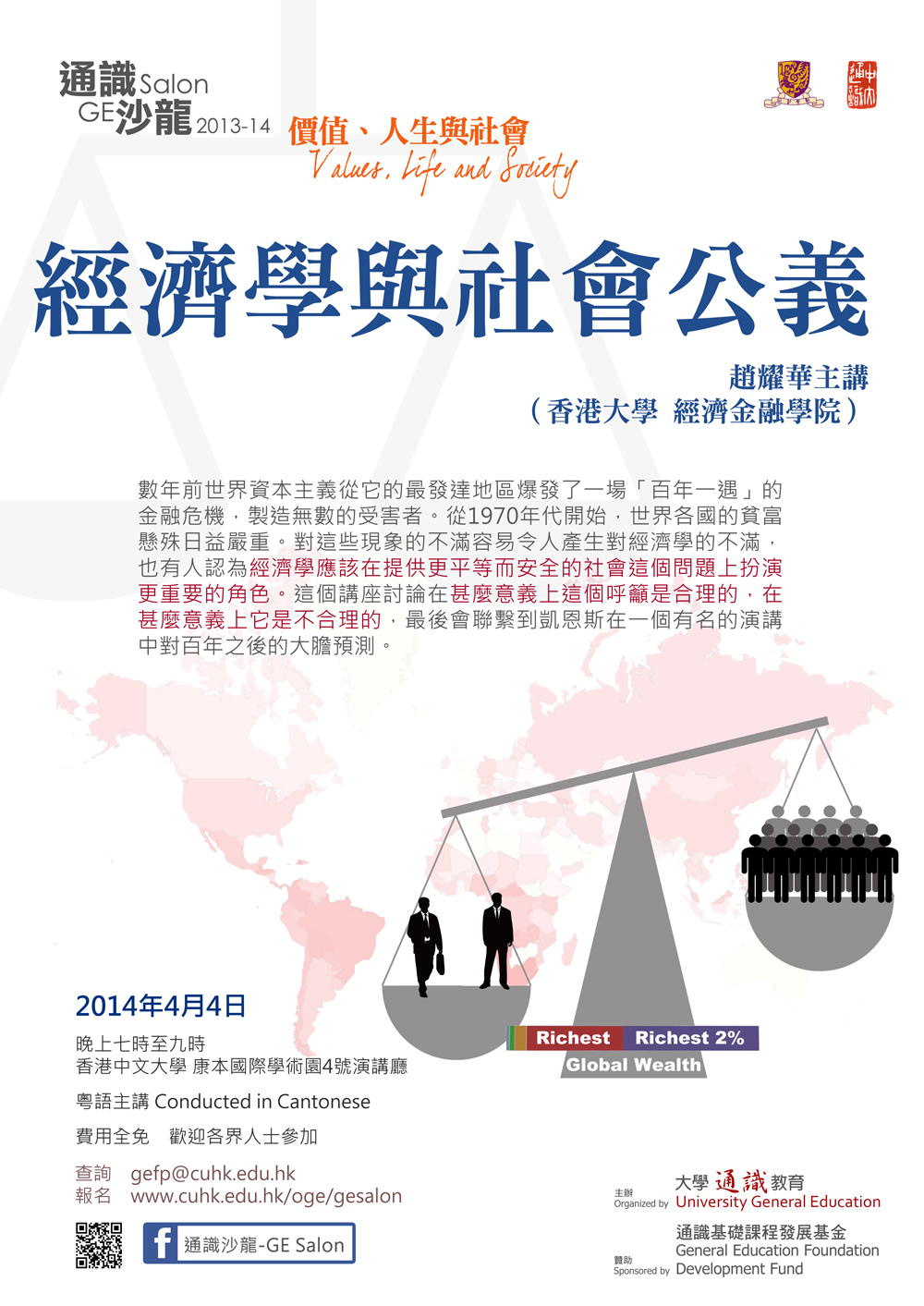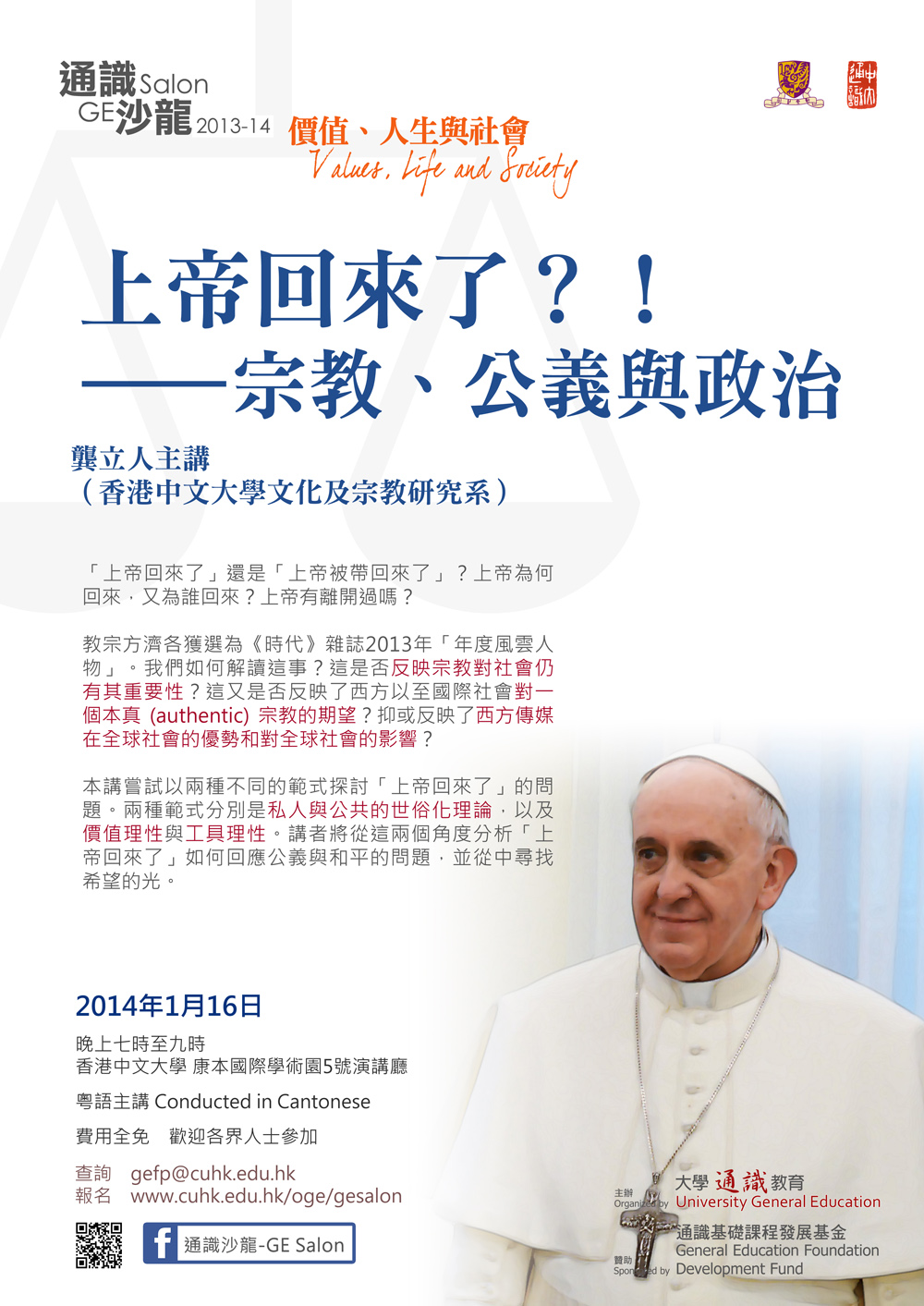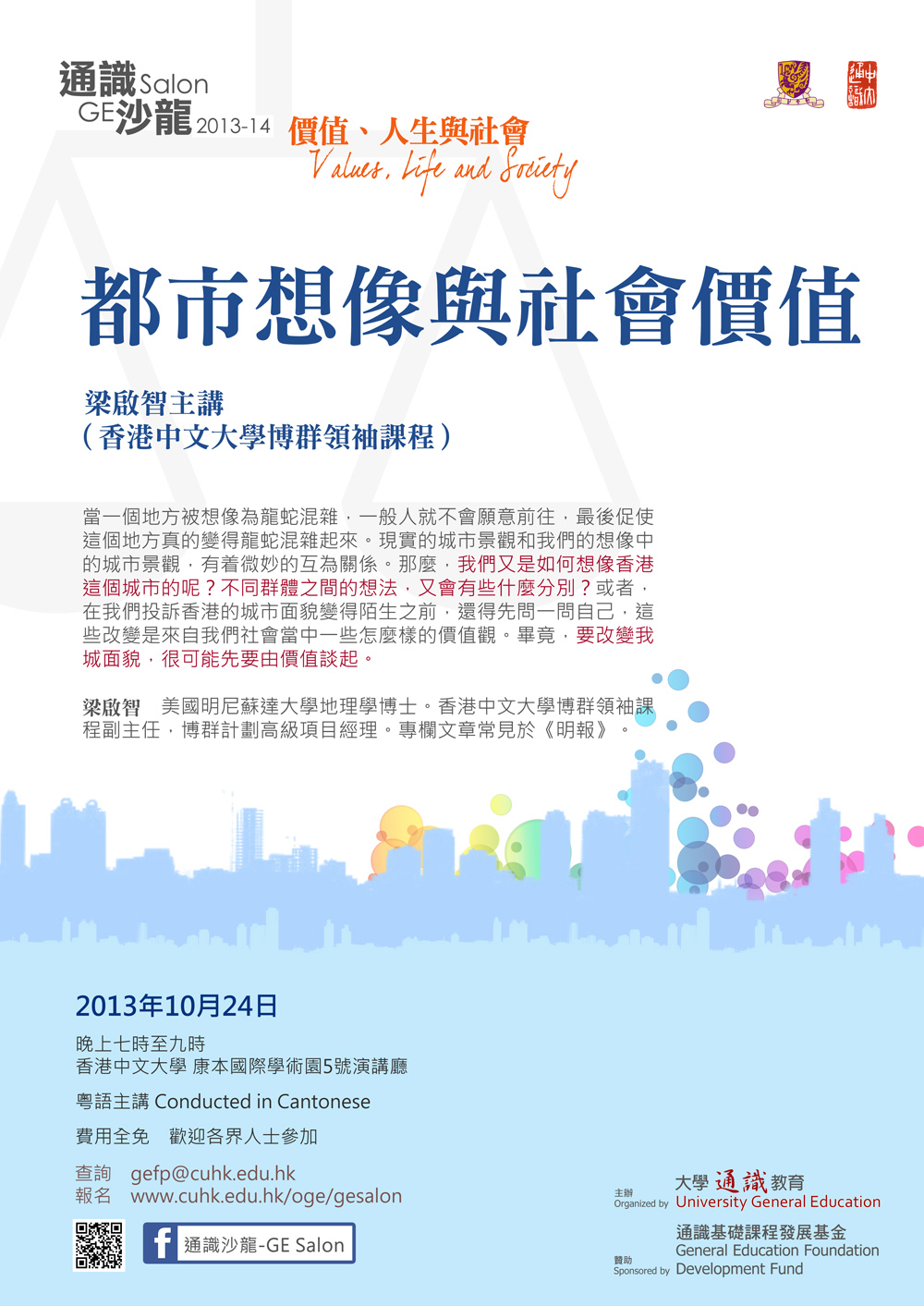The Flowing Spring of Knowledge
價值、人生與社會 Values, Life and Society
The Flowing Spring of Knowledge
Speaker: Prof. Chen Tien Chi
Brief Description
The Chinese proverb,
Three smelly coblers make one Juge Liang.
corresponds well with the riddle-lie saying by Aristotle two thousand years earlier,
The whole is greater than the sum of the parts,
despite the difference between East and West, the present and the past. Both point out that a system often possess “emergent property” not found in the constituent parts. The linear mathematics we usually rely upon here sadly fails, and must yield to simple “nonlinear mathematics” which in addition easily extend the domain of validity of the philosopher’s saying to all “quantitative changes.” But he never did raise the question of “qualitative change,” found in many physical phenomena, all chemical reactions and all life processes. These are also common of emergence.
This talk is based on the speaker’s forthcoming general education book, Geyser from the Sea of Knowledge, which start from simple systems theory, attempts with plain language, primary school and high school mathematics, to give a birds-eye view of science, and briefly introduce the intriguing beauty of fractals, the revelations of chaos, the appearance and nesting of self-organizations, the evolution of Mother Nature, and the operational harmony of mass societies.
In Cantonese
Economics and Social Justice
價值、人生與社會 Values, Life and Society
Economics and Social Justice
Speaker: Prof. Chiu Yiu Wah
Brief Description
The past decade has witnessed the most serious global economic crisis in the last half century, causing great sufferings among the public. Income inequality has also been worsening in most countries in the last few decades. There is an urge from the public for economics and economists to provide more informed discussions or even an activist role in leading to more equitable and secure society. This talk discusses to what extent such an urge is justified and to what extent it is not. It ends with some reflections on some of the predictions John Maynard Keynes made in his talk “Economic Possibilities of Our Grandchildren”.
In Cantonese
Mobile, Justice and Social Movements
價值、人生與社會 Values, Life and Society
Mobile, Justice and Social Movements
Speaker: Prof. Qiu Linchuan
In Putonghua
1984 and Brave New World
價值、人生與社會 Values, Life and Society
1984 and Brave New World
Speaker: Dr Wong Kim Fan
In Cantonese
Dewey, Democracy and Education
價值、人生與社會 Values, Life and Society
Dewey, Democracy and Education
Speaker: Dr Leung Cheuk Hang
Brief Description
What is democracy? American philosopher John Dewey believes that democracy does not merely mean universal suffrage, but also a way of life which entails an experience of public life for communal growth. As such, education plays an important role in the humanities aspect. In addition to its instrumental function in transmitting professional knowledge, education should be oriented with public enlightenment activities to foster active participation of citizens in public affairs. An ideal form of democracy should be embodied in a form of reflexive social cooperation. As civic education is being marginalized these days, reading Dewey’s Democracy and Education will enable us to understand the relationship between politics, education and community.
In Cantonese
God is back?! – Religion, Justice and Politics
價值、人生與社會 Values, Life and Society
God is back?! – Religion, Justice and Politics
Speaker: Prof. Kung Lap Yan
Brief Description
Is ‘God back’ or is ‘God brought back’? Why and for whom is God back? Or is God always presence?
Time magazine named Pope Francis its Person of the Year (2013). How is this to be interpreted? Does it mean religion is still significant to society? Does it express the western as well as international community’s expectation of what an authentic religion should be? Does it reflect the western media has a better vantage as well as a greater impact on global society?
In this talk, I am going to use both the paradigm of secularization theory of private and public, and that of value rationality vs instrumental rationality to explore how ‘God is back’ is responding to the issues of justice and peace, and to discover an aura of hope.
In Cantonese
Eichmann in Jerusalem: A Report on the Banality of Evil
價值、人生與社會 Values, Life and Society
Eichmann in Jerusalem: A Report on the Banality of Evil *
Speaker: Mr. Tai Yuen Hung
Brief Description
We are going to prolong Arendt's philosophical reflections on the banality of evil and the political world starting from von Trotta's film Hannah Arendt (2012). Although it is well known that Arendt refused to be named as philosopher, one could gain a better understanding of Arendt's insistence on the problem of evil by referring to the relevant discussions in modern European philosophy. In Eichmann in Jerusalem (1963), Arendt deepened her remarkable analyses of the totalitarian regimes first appeared in The Origins of Totalitarianism (1951). We are going to revisit some of her important insights in revealing the constitutive processes of totalitarianism, like rendering individuals superficial, forming isolated subjects, alienating the capacity of judging and consequently alienating the public world of political actions. All these, in the eyes of Arendt, bring about the phenomenon of thoughtlessness in the present epoch. Nowadays more and more scholars recognize Arendt's phenomenological way of thinking as the distinctive contribution to the contemporary arena of philosophy and political theories.
Mr. Jacky Tai: He is teaching humanities and general education in universities. His research interests include contemporary French philosophy and modern European philosophy.
* Supported by Goethe Institut Hong Kong
In Cantonese
"The Personal is Political" – Gender, Sexuality and Justice
價值、人生與社會 Values, Life and Society
"The Personal is Political" – Gender, Sexuality and Justice
Speaker: Prof. Choi Po King, Mr Cho Man Kit
Brief Description
In November 2009, Ms W, a post-operative male-to-female transwoman, was refused marriage with her boyfriend in her post-operative gender. She lodged a judicial review against the decision of the marriage registrar, asking the Court to recognize the right of trans people to marriage. She lost in the Court of First Instance and the Court of Appeal but finally won the case in the Court of Final Appeal by 4 to 1. Throughout the judicial battle that lasted for about 4 years, the visibility of transgender community in the media is greatly increased. The brave coming-out of trans people forces us to reflect on whether they are "only" a gender minority or whether they are actually a lens through which we could examine the very notion of gender itself ? In what way does the lived experience of trans people lead to a concept of justice that values gender diversity? What challenging questions do they pose to gender education that rests on a male vs female framework?
In Cantonese
Urban Imaginations and Social Values
價值、人生與社會 Values, Life and Society
Urban Imaginations and Social Values
Speaker: Dr. Leung Kai Chi
Brief Description
When a place is imagined as disarrayed, normal people will tend to stop visiting, and eventually turn this place into a truly disarrayed location. There is an intricate mutual relationship between urban landscapes in the real world and in our imaginations. So how do we imagine Hong Kong as a city? Do we have different conceptions among social groups? Perhaps before complaining that the city has become foreign to us, we should first ask ourselves that, what kinds of values in our society have induced these changes. After all, if we want to change the look of our city, we may we well need to start from its values.
Leung Kai Chi: PhD in Geography, University of Minnesota, USA. Assistant Director, I.CARE Leadership Programme; Senior Managing Officer, I.CARE Programme, CUHK. Op-ed Columnist at Ming Pao Daily.
In Cantonese
Three Forms of Democracy: Representative, Direct and Deliberative
價值、人生與社會 Values, Life and Society
Three Forms of Democracy: Representative, Direct and Deliberative
Speaker: Prof. Chan Kin Man
Brief Description
Some have claimed that, despite its many disadvantages, democracy is the best form of government. It has also been claimed that although democracy does not always select the best people, it can prevent tyranny. So what is democracy for? In addition to the prevention of tyranny, can democracy make the people master of themselves? Will the rule of the people bring about good governance? The speaker will share his thoughts about these questions and discuss three ideas of democracy: (1) representative democracy with popular elections through which the executive and the legislative branches are elected; (2) direct democracy in which people participate directly in public affairs; and (3) deliberative democracy which involves rational dialogues in public spheres.
In Cantonese




 YouTube Part 1
YouTube Part 1









